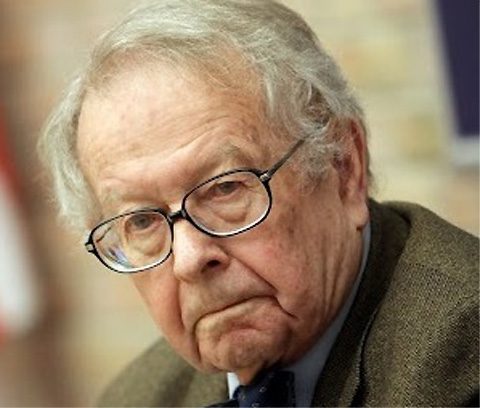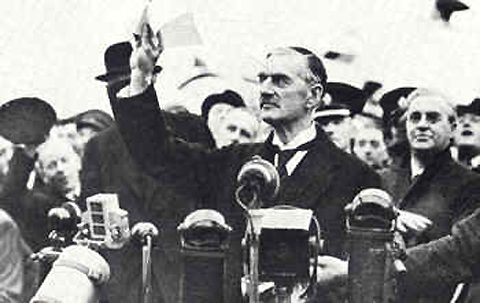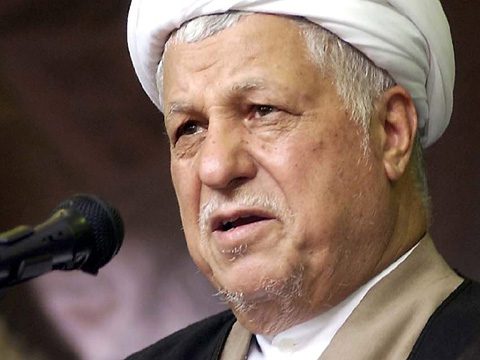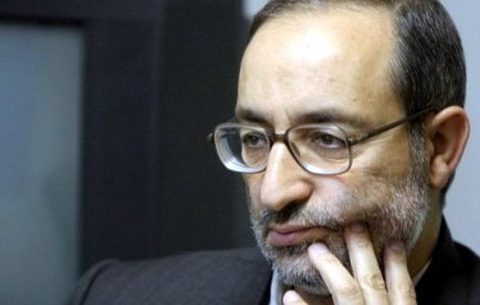With the Iranian army practicing mock missile strikes on U.S. bases in Afghanistan, China only begrudgingly joining the European Union’s sanctions against Tehran, and the Israeli air force calculating firing solutions on Iran’s nuclear facilities, the headline in Foreign Affairs was startling: “Why Iran Should Get the Bomb.”
 For more than a decade, the specter of a nuclear-armed Iran has frightened the world. After all, this is a regime that believes that if it can topple Western civilization, Iran will usher in the “second coming” of the Shi’ite messiah – five-year-old Muḥammad ibn al-Ḥasan al-Mahdī, the long-awaited twelfth Imam, who vanished into a well in 941 A.D.
For more than a decade, the specter of a nuclear-armed Iran has frightened the world. After all, this is a regime that believes that if it can topple Western civilization, Iran will usher in the “second coming” of the Shi’ite messiah – five-year-old Muḥammad ibn al-Ḥasan al-Mahdī, the long-awaited twelfth Imam, who vanished into a well in 941 A.D.
Iran’s fundamentalists teach that al-Mahdī will end his “occulation” or 1,000 years of invisibility — and will return to lead Iran’s restoration of the ancient Persian Empire and the imposition of worldwide Islam.
Speaking at a Tehran conference on Thursday, the speaker of the Iranian parliament, Ali Larijani, declared “the time has come for the disappearance of the West and the Zionist regime – which are two dark spots in the present era – from the face of the universe.”

Iran’s Press TV quoted him as calling America and Israel the world’s “prime sources of tyranny and gloom.” Meanwhile, Iran’s president Mahmoud Ahmadinejad has declared that America is blocking al-Mahdi’s return.
As Larijani was calling for the obliteration of Western civilization, out in the vital oil tanker shipping lanes of the Persian Gulf, Iran’s Islamic Revolutionary Guard Corps were conducting “The Missiles of the Prophet” naval exercises at the Strait of Hormuz – demonstrating that they can hit targets in Israel, Afghanistan and Europe.
“The show of force is designed to coincide with the start in Istanbul of a new set of talks on Iran’s nuclear program, where Tehran faces the five permanent members of the UN Security Council plus Germany,” notes Amir Taheri in the New York Post. The talks, he writes, are pointless.
“It must be clear to anyone who has followed all this that Iran is acting in accordance with a famous Persian proverb: Leading the horse to water and bringing it back thirsty. That is,” writes Taheri, “Tehran will only make time-consuming gestures toward letting the ‘horse’ drink – but will never actually agree to stop the core of its nuclear program, which consists of enriching as much uranium as it can at higher and higher levels.”

Iran’s ultimate goal, says Taheri, is to provoke a nuclear holocaust and pave the way for al-Mahdi, the “Hidden Imam” to re-establish Islam to its original, purest message, reveal the obscure secrets of the Holy Quran and make Iran’s Shi’ite brand of Islam the worldwide religion.
“The whole world will be brought into submission,” writes Amir Moezzi in the Encyclopedia Iranica. “Powers of inequality and obliviousness will be all eliminated, the earth will be inflated with justice and wisdom, and mortality revitalized by knowledge.”

But blocking al-Mahdi’s return are not only the “Great Satan,” the United States, but also Israel, which Ahmadinejad describes as a “fake regime” that “must be wiped off the map,” reports the New York Times.
In his annual appearances at the UN, Iran’s president regularly lectures the world’s diplomats that Iran is divinely called to pave the way for this Shi’ite messiah, who will “dry the roots of all injustice in the world” and obliterate all other religions.
Toward that end, Iran is developing missiles that, according to WikiLeaks-released secret diplomatic cables, are worrisome even to Iran’s closest ally, Russia – which told the U.S. “that Iran’s latest efforts on improving the accuracy and range of its Shahab-3-class liquid-propellant missiles have produced a weapon that can reach targets in the Middle East and Southeastern Europe with an accuracy of several kilometers. However, given that they have only conventional warheads, these missiles cannot do substantial damage.”
So, against this backdrop, in Foreign Affairs magazine, Professor Kenneth N. Waltz says it is time to back off and let Ahmadinejad develop his nuclear weapons.

Even strident peacenik Noam Chomsky admits Iran’s Revolutionary Guards “are behind some of the deadliest terrorist attacks of the past three decades” and Iran bankrolls the notorious terrorist organizations Hezbollah and Hamas.
Who would hand over nukes to such opponents of world peace?
Waltz, according to Columbia University “has spent much of his scholarly career proposing controversial realist theories.”
Realist theories? Waltz is a “realist” – but not in the traditional sense. Waltz’s kind of realism explains to small children that Bambi will be slaughtered by hunters, burned alive in an inevitable second forest fire or die a slow and painful death by intestinal parasites – rather than become the majestic new prince of the forest.
Waltz has generated attention in the past with assertions that the United States military is probably unnecessary since America really doesn’t have any real international enemies, that North Korea isn’t a threat to anybody except its own starving and subjugated citizens, and that China doesn’t really have any ambitions of invading Taiwan or trying to dominate Asia.
If he had been writing essays in 1938, Waltz would have joined Neville Chamberlain’s chorus that the Nazis weren’t all that bad; that as soon as Hitler was through annexing Czechoslovakia and perhaps Poland, he would make good on his promise to usher in “peace in our time.”

Among the reasons Waltz cites for why a nuclear-armed Iran would be a good thing are:
1) It would produce a more stable balance of military power in the Middle East: “Israel’s regional nuclear monopoly, which has proved remarkably durable for the past four decades, has long fueled instability in the Middle East. It is Israel’s nuclear arsenal, not Iran’s desire for one, that has contributed most to the current crisis. In fact, by reducing imbalances in military power, new nuclear states generally produce more regional and international stability, not less.”
Generally? What about when a regime doesn’t follow everybody else’s rules? Throughout the Cold War, a policy of “Mutual Assured Destruction” kept NATO and the Warsaw Pact from nuking each other. It was well understood that automatic response systems were in place that would trigger a massive response– even if the attacked nation was in ashes. Had the Soviets wiped out U.S. leadership and command, the consequences would have been submarine-launched total devastation of Mother Russia.
Iranian officials on the other hand do not fear such a scenario, but publicly embrace such a war obliterating civilization. A senior official in Iran’s Revolutionary Guard told a Tehran newspaper that the United States is within reach of Iranian attack. If the U.S. hits key targets in Iran to halt its nuclear weapons program, “we will have a crushing response,” said Massoud Jazayeri. “We will not only act in the boundaries of the Middle East and the Persian Gulf; no place in America will be safe from our attacks.”

Sure, he knows that the U.S. response to an Iranian attack – particularly a nuclear strike – would be cataclysmic. If Iran somehow managed to explode a nuke on U.S. soil, no Russian or Chinese veto in the United Nations would prevent Tehran from becoming a smoking, radioactive ruin.
But Iran has indicated that they don’t fear such a fate – it will summon al-Mahdi, that anointed child last seen at the beginning of the Dark Ages.
Waltz also asserts:
2) It would reduce the risk of war between Israel and Iran: “If Iran goes nuclear, Israel and Iran will deter each other, as nuclear powers always have. There has never been a full-scale war between two nuclear-armed states. Once Iran crosses the nuclear threshold, deterrence will apply, even if the Iranian arsenal is relatively small.”
Such a conclusion is less than unanimous. “Are Iran’s Leaders, Well … Crazy?” ask Kimo Quaintance and Bernd Kaussler in The Diplomat magazine. “The most vocal supporters of preventative military strikes against Iran’s nuclear weapons program claim that Iran is developing nukes to use them, rather than to deter the United States and its allies from invasion.

“This inversion of the Cold War theory of nuclear deterrence assumes that Iran doesn’t have the capacity for rational choice. After all, as the argument goes, if the Iranians are crazy, then the certainty of national suicide won’t stop them from seizing the opportunity to unleash their new nuclear weapons on Israel.
“A state that believes the end of the world is coming (never mind thinking it has the special responsibility to usher in Armageddon) can’t be considered likely to weigh costs and benefits in any rational, self-preserving way.”
Waltz also writes:
3) It would produce a more cautious Iran: “History shows that when countries acquire the bomb, they feel increasingly vulnerable and become acutely aware that their nuclear weapons make them a potential target in the eyes of major powers. Maoist China, for example, became much less bellicose after acquiring nuclear weapons in 1964, and India and Pakistan have both become more cautious since going nuclear.”
But, Iran is not Russia, India, China or the other existing members of the nuclear club, notes Boston Globe op-ed writer Jeff Jacoby. “Time and again Iran has called explicitly for the extermination of Israel, while making clear that it sees nuclear weapons as a practical means to that end. ‘The use of even one nuclear bomb inside Israel will destroy everything,’ Iranian president Hashemi Rafsanjani baldly explained in 2001. ‘However, it will only harm the Islamic world. It is not irrational to contemplate such an eventuality.’”

Remember that we’re talking about Iran, a nation that doesn’t even have a systematic security clearance program for its military personnel, remind Quaintance and Kessler. In the madness that is Iran today, “Revolutionary pedigree and contacts to the right spheres of power are no longer sufficient to remain at the top,” so once nuclear weapons enter the mix, “existing power struggles and cabals amongst the country’s maze of power centers and factions” are certain to grow. “This begs the practical question of how the Iranian regime could assure even itself that accidental or unauthorized use wouldn’t be possible. After all, it took the United States decades to achieve any real degree of the complex technical and organizational requirements that help ensure meaningful nuclear safety.
“In addition to complex organizational procedures intended to assure proper chain of command for launch authorization, current U.S. nukes are secured through sophisticated encrypted arming systems that prevent unauthorized or accidental detonation, as well as high-tech tamper-proof casings to prevent the theft of the ‘physics package’ inside a warhead.”
Iran apparently lacks any such safeguards. What a nightmare if any imam could push the button.

“However evil the Soviet Union, they were not crazy,” writes Abe Foxman in the Jerusalem Post. In Iran, there is “an element of irrationality and apocalyptic thinking.”
By proposing that Iran be allowed nukes, Waltz demonstrates that he is “particularly out of touch.”
“Taken to its logical conclusion,” quips fellow “realist” and Foreign Relations contributor Stephen M. Walt, “Waltz’s argument implies that the United States ought to simply give Iran a few nuclear weapons.”
“Just ask the Arab states whether they agree with these conclusions,” writes Foxman. “The U.S. diplomatic cables leaked by Wikileaks made clear that the Gulf States are just as concerned about an Iranian bomb as is Israel.
“They see an Iran with a bomb as a nation that will try to intimidate its neighbors, make greater claims over disputed territories and try to promote Shi’a interests over Sunni — in other words, a major force for instability.
“And what will they do about it? Inevitably, some will seek their own nuclear capacity to offset Iran.”

What is Iran’s vision of the future? “A top Ahmadinejad officer, Brig. Gen. Mohammad Kossari, who heads the political watchdog, or Security Bureau, of Iran’s armed forces, recently taunted the U.S. when he bragged ‘we have identified all the weak points of our enemies’ and have sufficient cannon fodder — i.e., suicide operation volunteers – ‘ready to strike at these sensitive locations.’
“Iranian television,” wrote Arnaud de Borchgrave back in 2006, “recently broadcast an animated film for Iranian children glorifying suicide bombers.”
“Ahmadinejad’s Shi’ite creed has convinced him lesser mortals can not only influence but also hasten the awaited return of the Mahdi,” wrote de Borchgrave. “Iran’s dominant ‘Twelver’ sect holds that this will be Muhammad ibn Hasan, the righteous descendant of the Prophet Muhammad.
“He is said to have gone into ‘occlusion’ in the 9th century, at age 5.
“His return will be preceded by cosmic chaos, war, bloodshed and pestilence. After this cataclysmic confrontation between the forces of good and evil, the Mahdi will lead the world to an era of universal peace.
De Borchgrave notes: “The ultimate promise of all Divine religions,” says Ahmadinejad, “will be fulfilled with the emergence of a perfect human being [the 12th Imam], who is heir to all prophets. He will lead the world to justice and absolute peace. Oh mighty Lord, I pray to you to hasten the emergence of your last repository, the promised one.”
Ahmadinejad, “reckons that the return of the Imam” is imminent.
“When he became Iran’s sixth president since the 1979 revolution, Ahmadinejad decided to donate $20 million to the Jamkaran mosque, a popular pilgrimage site where the faithful can drop their missives to the ‘Hidden Imam’ in a holy well” where the 5-year-old imam was last seen centuries ago.
“Tehran’s working-class faithful are convinced the new president and his Cabinet signed a ‘compact’ pledging themselves to precipitate the return of the Mahdi – and dropped it down Jamkaran’s well,” wrote de Borchgrave.

Ahmadinejad believes that selflessness and martyrdom-seeking is the only way to save mankind, according to Turkish Weekly, “We are all obliged to keep alive the culture of martyrdom-seeking in the society.”
Ahmadinejad made the remarks while meeting with families of several suicide bombers and war veterans, telling them “martyrdom-seeking is our most effective weapon and best guarantee for our national security. Ruthless enemies who have a chronic enmity against our country and our nation have not succeeded in achieving their objectives so far thanks to the existence of this culture of martyrdom-seeking among our nation. He who is ready for martyrdom is always victorious.”
Indeed, “Martyrs enjoy the highest status of humanity in this world and the Hereafter,” said Iran’s president. “People spend tough years of strenuous work in a bid to achieve the peaks of grandeur and pride, while our dear martyrs achieved those high peaks in shortest possible time.”
Giving him nuclear weapons makes no sense.
“Waltz’s piece,” writes Foxman, “is absurd on its face.”
“If Waltz’s breezy nonchalance strikes you as outlandish, you aren’t alone,” writes Jacoby in the Boston Globe. Indeed, Daniel Pipes, historian, political commentator, director of the Middle East Forum and editor of Middle East Quarterly journal, calls Waltz’s article “the single most preposterous analysis by an allegedly serious strategist of the Iranian quest for a nuclear weapon.”
“To the American Enterprise Institute’s Gary Schmitt , a former staff director of the Senate Select Committee on Intelligence,” writes Jacoby, “it recalls Alfred E. Neuman’s mantra: ‘What, me worry?’

“The notion that Israel’s nuclear capability destabilizes the Middle East is almost self-refuting,” continues Jacoby.” As for the calming effect of an Iranian bomb, that’s hard to square with the Arab world’s alarm at the prospect : ‘If Iran develops a nuclear weapon,’ Saudi Prince Turki al-Faisal has warned, ‘we will have to follow suit.’
“Let a regime that hungers for apocalypse and genocide get the bomb?” asks Jacoby. “Welcome it? Even Dr. Strangelove wouldn’t go that far.”


